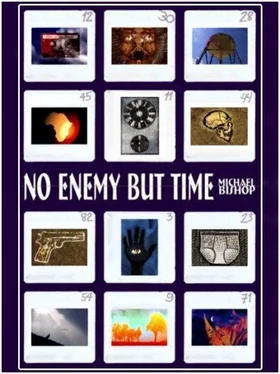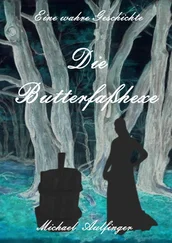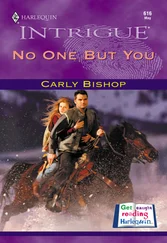Dragon Lady’s kid sister wiped his face with a silk scarf and signaled her helplessness to Joshua by shrugging. They had exchanged no more than ten words since leaving the pavilion.
“Where’s he from?”
“Hurlbutt Field,” said the girl with no trace of accent, in spite of which Joshua had decided that she was of Thai or Vietnamese extraction. “He tells me he’s going to be a Ranger.”
“Hockey, baseball, or forest?”
“I don’t know what you mean.”
“Never mind. We’d better put him someplace where he can sleep off his zonk. If he goes back to Hurlbutt like this, he’ll spend the next few days bayonetting potatoes instead of make-believe Iranians.”
“He rented a car. It’s over there.”
They laid the would-be Ranger in the back seat of the rental car, a blue Plymouth Fury, rolled up his pants legs, and placed the girl’s dampened scarf on his head for a compress.
The girl drove west along the highway to a deserted section of the dunes. Joshua followed on his Kawasaki. In the lee of a mimosa tree they discussed what else they should do for the fellow. By now, stars were guttering in a fabric of blowing clouds.
“He doesn’t have to be back until five o’clock Sunday evening. His pass is for the entire weekend.”
“Let’s crack a couple of windows, lock the keys up in the car with him, and let him sleep. He’s not going to convulse or suffocate, and nobody’ll bother him out here.”
In khaki-colored shorts and a T-shirt like her companion’s, the girl resembled a rather coltish Brownie Scout. She was almost exactly Joshua’s height, but slender, ethereal-looking. She was noticeably hesitant about accepting his suggestions, not so much out of loyalty to her date, Joshua thought, as from a cagey distrust of his own motives. No dummy, this one.
“I’ll let you drive,” he said, pointing at his motorbike. “If I misbehave, you can steer us into oncoming traffic and put the fear of God back into me.”
“If you drive, maybe you’ll be too busy to misbehave.”
“But you’d have no control over where I was taking you.”
“Would you go someplace besides where I asked you to?” She cocked her head and studied him critically. “If it comes to it, I can hitchhike home.” She set off through the dunes toward the highway.
Flustered, Joshua walked along beside her. How was he supposed to address this sensuous Asian waif with magical hair and eyes like a pair of melting chocolate kisses? Not even his residence in New York—his exile, as he sometimes thought of it—had taught him how to proceed. He was a novice in these matters, an aspirant.
“How old are you?” he blurted.
“Seventeen.”
“I’m nineteen this November.” Even though November seemed at least as far away as Ho Chi Minh City, that put him back up. “I meant it when I said you could drive. I’ve just been paid. Take me back to the Strip and I’ll buy you something to eat.”
The girl halted. “A foot-long and a Coke?”
“Anything you want. I’ve just been paid.”
“Yeah, you told me.” She glanced back at the rental car beneath the mimosa tree. “All Rudy wanted was uppers, downers, and onion rings. He washed ’em down with white wine and Pabst Blue Ribbon, back and forth—just like this.” Rustling her hair like a veil of chain, she demonstrated Rudy’s unmannerly technique.
“Jesus.”
The girl smiled. Her smile was the fulcrum upon which his hopes precariously teetered. “I’ve never ridden a motorcycle,” she said. “I think I’d like to try.”
* * *
Her name, once upon a time, had been Tru Tran Quan, but now she was known as Jacqueline Tru. Her father, who had emigrated to the United States long before anyone had ever heard of Boat People or suspected that Saigon was ripe for the picking, ran a small ethnic restaurant where foot-longs and onion rings were not even on the menu. Although Joshua and Jackie did not eat in the old man’s establishment that first night, before the summer was over they had devoured rice, diced chicken, and fried vegetable sprouts in so many different combinations that Joshua began to regard mayonnaise as an exotic condiment and hamburger soup as a consommé devoutly to be wished.
Kha, the old man, had been a colonel in the Army of the Republic of Vietnam until early in the first administration of Richard Nixon, at which time he had come to Lackland Air Force Base in Texas with his wife and three children on a mission of mercy approved by the U.S. State Department. Madame Tru was suffering from a rare blood disorder for which she had been promised treatment at either the base hospital or the facility in Houston where Dr. Denton Cooley had made heart transplants as commonplace as tonsillectomies. A wealthy man, Kha had reputedly reimbursed the American government for the privilege of bringing his entire family into the country during a time of private as well as public anguish.
Unfortunately, Madame Tru collapsed and died upon first setting foot in an examination room at Lackland, a victim of the combined effects of her disease, her wearisome trip, and her own apprehensions. Reacting swiftly, Kha told the authorities that he was resigning his commission in the ARVN and requesting political asylum in the United States. He did not want to go back to the institutionalized chaos of a disintegrating war effort and a corrupt South Vietnamese regime. Besides, his only son was thirteen, fast approaching draft age.
“But you can’t seek political asylum in the country of your government’s foremost ally,” a bespectacled official from the State Department told Tru. “It doesn’t make sense.”
“It does not make sense to ask a favor of a friend?” asked Tru Quan Kha.
“Of course not. You ask political asylum of a foe of the government you are seeking to flee.”
“My friend and my foe have the same face.”
“Then surely you can see your way clear to return to Saigon without resigning your commission and provoking an embarrassing incident.”
“The Republic of Canada honors your northern border,” Tru Quan Kha reflected aloud. “It is safer here.”
The government sought to return Colonel Tru against his will, but his son—a boy well-versed in both the English language and the many uses of the public media—went to the San Antonio newspapers with his father’s story and the startling disclosure that Tru would pay a handsome sum to any unattached native-born American woman who would marry him. By this stratagem, the boy admitted, Tru hoped to secure for his children and himself the same inalienable blessings of liberty enjoyed by the American people. Owing to quick government reaction, only a few of the newspapers containing this story made it to the streets. Nevertheless, ten or twelve patriotic bachelorettes responded favorably to Tru’s offer, and the publicity attending this local uproar threatened to leak out of San Antonio into other parts of the country. Gun-shy, the government relented. Tru was permitted to marry a fiftyish lady named Brenda Lu Bruno and so to acquire his citizenship.
Tru promptly moved to Florida, for he wanted to see grapefruit trees, Disneyworld, and Ritki’s Gift & Souvenir Emporium. He and Brenda Lu Tru did not live together, but corresponded regularly and filed a joint tax return each year to keep Uncle Sam off their backs. For over a decade, then, his son and daughters an ever-present solace, Tru Quan Kha had been a happy man.
* * *
Joshua did not initially increase his happiness. The old Vietnamese looked upon blacks as walking burn victims, who, if he touched them, would scream or slough off a pink-backed rind of charred flesh. Nor did he like being so much taller than Joshua. Even the age-induced curvature of his spine did not lower him to the young man’s eye level. Was his daughter—a good Catholic girl rechristened Jacqueline after the slain president’s widow—was Jacqueline going to marry a bruised toe of a man instead of a Robert Redford clone with a bankbook as thick as the Gutenberg Bible? Perhaps. No one could fathom Jackie’s intentions. And if Joshua was in her plans, how could Joshua increase Kha’s happiness?
Читать дальше



![Ally Carter - [Gallagher Girls 01] I'd Tell You I Love You But Then I'd Have to Kill You](/books/262179/ally-carter-gallagher-girls-01-i-d-tell-you-i-lo-thumb.webp)








